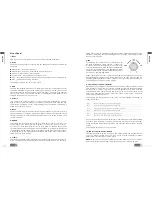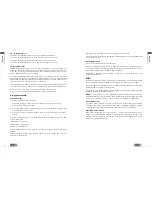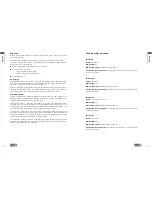
As the treble control is increased
clockwise
the sound will become brighter. At the
maximum settings the sound will be aggressive and cutting. This setting is saved
when you store a patch.
8. ISF
The patented I
:
F control works in conjunction with
the
)
ass, Middle and Treble controls. It allows you
to choose the exact tonal signature you prefer. Fully
counter clockwise has a more American characteristic
with a tight bottom-end and more aggressive middle,
and fully clockwise has a
)
ritish characteristic which is
more ‘woody’ and less aggressive.
Unlike conventional ‘contour’ controls and parametric equalisation systems, the
)
ass, Middle and Treble controls remain interactive with each other just like in a
traditional guitar amplifier tone stack. This leads to a very familiar, musical response.
This setting is saved when you store a patch.
9. TVP (True Valve Power) Selector
)
lackstar’s patent-applied-for True
=
alve Power offers six distinctly different power
valve responses
¶
E
3
84, 6
=
6, E
3
34, KT66, 6
3
6 and KT88. When engaged it delivers
the response, dynamics, sag and break-up characteristics of a valve amp and
uniquely delivers the same acoustic power output as an equivalent valve power
amp. This means that these amps deliver live without compromise
¶
True
=
alve
Power means
3
OUD as
=
alve
TM
.
T
=
P changes the characteristics of the sound from compressed and spongy to
dynamic and tight.
E
3
84
)
ell-like full bodied Class A with lots of compression
6
=
6
Crisp Class A with high compression and tight mids
E
3
34
Classic
)
ritish Class A/
)
crunch with full bodied soft break-up
KT66
Rich and warm vintage
)
ritish hot biased Class A/
)
6
3
6
Tight dynamic Class A/
)
with extended high and lows
KT88
Tight, bold and dynamic Class A/
)
with strong low end
As you move from E
3
84 to KT88 the amount of compression and overdrive available
from each valve response is reduced. Additionally, when either of the two clean
voices is selected the output compression and overdrive are affected by the gain
control.
This setting is saved when you store a patch.
10. TVP (True Valve Power) Switch
Pressing this switch turns T
=
P on and off. The internal button
3
ED will light to show
T
=
P is on. When the
3
ED is off, T
=
P is not active and the T
=
P
:
elector will be
deactivated. This setting is saved in a patch.
NOTE:
With T
=
P off the power amplifier has a linear response and you will not be
able to achieve the valve-like sag, compression and power that T
=
P delivers.
English
11
USA
UK
Front Panel
1. Input
Plug your guitar in here. Always use a good quality screened guitar lead.
2. Voice
The
=
oice control changes the preamp voicing, ranging from ultra clean to extremely
overdriven.
Clean Warm
¶
=
ery clean, dynamic
Clean
)
right
¶
‘
)
outique’, will break up when pushed hard
Crunch – Classic medium gain overdrive
:
uper Crunch – More gain and punch than Crunch
OD 1 – Hot-rodded Master
=
olume overdrive with medium power amp damping
OD 2 – Mid boosted hot-rod overdrive
This setting is saved when you store a patch.
3. Gain
The
.
ain control adjusts the amount of overdrive or distortion.
3
ow settings, counter
clockwise, will deliver a clean sound on the edge of break-up. As the
.
ain control is
turned clockwise the sound will become more overdriven, moving through beautiful
crunch tones until, at its maximum position, a full distorted tone is achieved. This
setting is saved when you store a patch.
4. Volume
This controls the preamp volume. Turning it clockwise increases the volume.
High levels of volume will introduce the effect of valve power amp distortion and
compression, depending on the T
=
P
9
setting you have selected. This setting is
saved when you store a patch.
5. Bass
The bass control adjusts the amount of low-end frequencies in your tone. This amp
has an advanced tone shaping circuit which allows the tone to be tight and cutting
counter clockwise
to warm and thumping
clockwise
. This setting is saved when
you store a patch.
6. Middle
The middle control adjusts the amount of middle frequencies in your tone. The
middle frequencies are particularly important in setting the amount of ‘body’
your tone has. With the middle control set to its minimum position (fully counter
clockwise
the sound will be aggressive and scooped, a tone ideal for aggressive
rhythm playing. As the middle control is increased (clockwise
the amount of ‘body’
is increased, which is more suitable for sustained lead guitar tones. This setting is
saved when you store a patch.
7. Treble
The treble control allows exact adjustment of the treble frequencies within the sound.
At low settings (counter clockwise
the sound will be warm and dark in character.
English
10





























